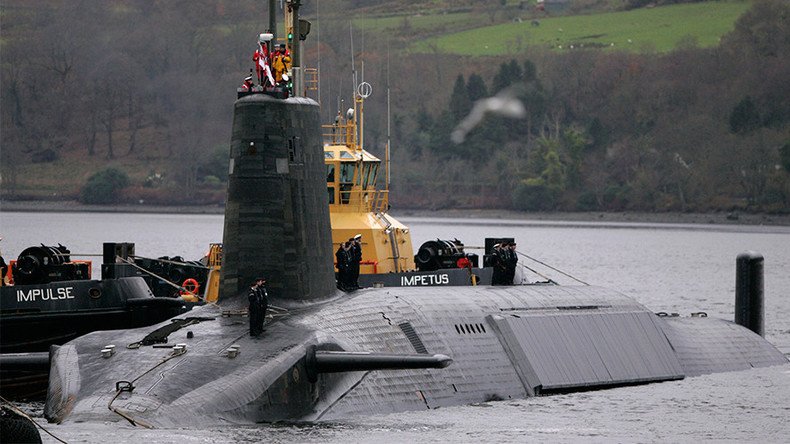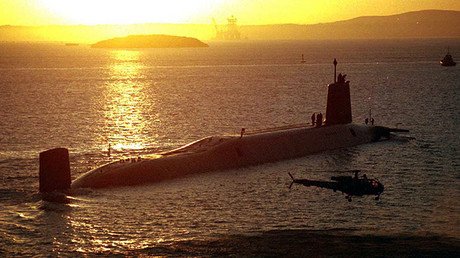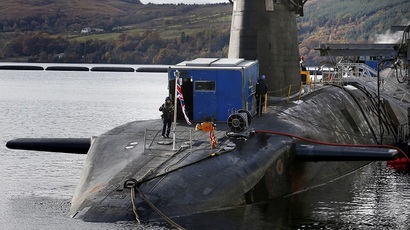Whitehall covered up 1st-time failure of Trident ballistic missile test near US coast – report

A Trident missile fired last year from a Royal Navy nuclear submarine off the Florida coast malfunctioned and headed to the mainland during a routine test, but Whitehall ordered a news blackout to avoid “severe panic,” the Sunday Times reported.
The Trident ballistic missile was set to be tested for the first time in four years by the HMS Vengeance last June off the Florida coast, according to the Sunday Times.
Vengeance, the fourth and final Vanguard-class nuclear-capable submarine of the Royal Navy, had undergone a refit in Devonport dockyard before heading out for a firing test to verify if the ship and her crew were ready for active service.
In June last year, the submarine docked at Port Canaveral in Florida, the US base employed by the Royal Navy for final checks, before launching an unarmed Trident missile into the so-called “Eastern firing range” off the west coast of Africa.
There have only been five firing tests by UK Vanguard-class submarines in the 21st century, the Sunday Times wrote, and the launches are usually big occasions for the Royal Navy, as the missiles cost 17 million pounds ($21 million) apiece.
No news reports followed the test, however, and no usual “successful test flight” announcement was made at that time.
A navy source told the newspaper that “something went wrong” after the Trident was fired from the submerged submarine. Details of the failure were not officially disclosed, but the source believes the missile might have veered off in the wrong direction toward the American mainland instead of heading across the Atlantic.
“There was severe panic that this test launch was not successful. Senior figures in military and government were keen that the information was not made public,” the source said. A malfunction of the ballistic missile – deemed the backbone of British strategic deterrent – could lead to terrifying casualties. It could also raise questions about the reliability of the Royal Navy’s nuclear arsenals.
“Ultimately, Downing Street decided to cover up the failed test,” the source added. “If the information was made public, they knew how damaging it would be to the credibility of our nuclear deterrent. The upcoming Trident vote made it all the more sensitive.”
UK Prime Minister Theresa May avoided any mention of the failed test to ensure that MPs approve spending of 40 billion pounds on new Trident submarines, in her first major speech before last July. Notably, more than 100 MPs voted against the proposal, including members of Scottish National Party (SNP) and the Labour Party, who argued that the money spent on nuclear arms could have been put to better use.
On Sunday, talking to the BBC, May again refused to say whether she knew about the reported failure or not. She said she had “absolute confidence” in the country’s nuclear deterrence system, but avoided giving a direct reply when asked to comment on The Times report.
The British government has not officially confirmed the newspaper's report on the misfire, but The Times quoted the ministry of defense as saying that Vengeance “conducted a routine unarmed Trident missile test launch,” and that the submarine and her crew “were successfully tested and certified.” It declined to elaborate on the causes of the malfunction “for obvious national security reasons.”
Lockheed Martin, the Trident manufacturer, did not comment on the issue either.
In 2015, William McNeilly, a former Navy weapons engineer who allegedly served aboard the HMS Victorious, claimed that a number of security lapses and technical issues with the Trident-armed submarines exposed the UK nuclear deterrent to potential terrorist attacks.
According to open sources, Vanguard-class submarines carry 200 nuclear warheads as well as so-called ‘letters of last resort’ of the British prime minister that are to be used in the event of a national disaster or an incapacitating nuclear strike. Stored inside safes in the control room of each submarine, the letters are believed to include the orders: “Put yourself under the command of the US, if it is still there”; “Go to Australia”; “Retaliate”; or “Use your own judgment,” according to the Guardian.
Labour MP Kevan Jones, who is calling for an inquiry into the report with Defence Secretary Michael Fallon, is expected to be called to the House of Commons.
“The UK's independent nuclear deterrent is a vital cornerstone for the nation's defence,” Kevan said.
“If there are problems, they should not have been covered up in this ham-fisted way. Ministers should come clean if there are problems and there should be an urgent inquiry into what happened.”
"Parliament was asked to vote on Trident renewal, but weren't given all the information. It wasn't fair to ask them to vote without all the facts - that is not democracy. We don't know if it would have changed the outcome of the vote last July, but it was wrong," said Veronika Tudhope, a member of the Scottish Green Party.
"They hadn't passed the tests multiple times when I was on patrol," William McNeilly, a former Trident weapons engineer-turned-whistleblower told RT via video link. "I have seen no proof that they can pass these tests. So, why are we wasting money on Trident?"















